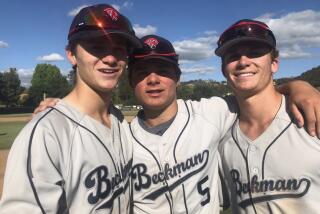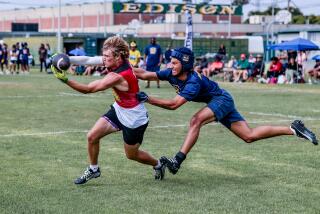THE HIGH SCHOOLS : Baseball’s Class System Leaves Selected Players With Educated Options
As an 8-year-old, Greg Fowble sat in front of the family television with his father, contracting his first dose of baseball fever.
“We were watching the Cincinnati Reds and Joe Morgan,” Fowble said. “And they were talking about his contract and how much money he made. At that time, I didn’t even know they got paid. I said, ‘I’ll pay them to let me play.’ ”
Fowble has since discovered that major league teams do not charge people to play for them--at least not monetarily. But nearly every player who wants to make it to the big leagues has to pay his dues somewhere. Whether it be in the minors or in college.
So what’s the best way to go: Class-A minor league or Class A university?
Until recently, that wasn’t much of a choice. Almost all big leaguers were products of the minors. But that was before the rapid development of college baseball, which has begun to rival the minors as a big-league training ground.
Given the choice in the past decade, more and more high school players have opted for college. But some say the trend is swinging back to the minor-league route to the big leagues. That claim is backed up by several Valley-area high school players who were chosen in this month’s free-agent draft. Scott Radinsky, Rodney Beck and Dave Milstien signed professional contracts, and Fowble is undecided.
Fowble, twice named All-City during his career at Granada Hills, was selected on the eighth round by the Cleveland Indians. He also was offered a full scholarship to play for national champion Arizona. He is scheduled to announce his decision today.
“It’s a real exciting time,” Fowble said on Thursday, the day after graduating from high school. “But at the same time, it’s a real confusing time. We’re talking about my future. It’s the biggest decision I’ve ever had to make.”
Everyone Fowble has run into, it seems, has some advice. “A majority of the people say go to school,” he said.
“Let me tell you,” said Milstien from Simi Valley, “everybody had to throw their two cents in.”
Milstien, selected by the Boston Red Sox in the eighth round, decided to take a shot at professional baseball right away. He left Saturday for Boston’s rookie league team in Elmira, N.Y.
Radinsky, a Simi Valley pitcher taken in the third round by the Chicago White Sox, left for Sarasota, Fla., Saturday to play in the Gulf Coast League. Grant’s Beck, a 13th-round pick of the Oakland A’s, will board a plane Monday and begin his minor league journey in Medford, Ore.
Simi Valley outfielder Shaun Murphy didn’t wait around for the draft, deciding in April to accept a full scholarship to Arizona.
Each player has his own story and own reasons for choosing one option over the other.
“I’ve wanted to play pro ball all my life,” said Beck, the City 4-A Player of the Year. “I looked at this as a chance to start young. The younger I start, the more time I have to prove myself.”
Said Murphy, giving his reasons for going to college: “I’ve heard that this is a good part of your life. It’s more of a security type of thing. You could always get hurt. Baseball is a funny game. At least, if things go wrong, I have an education.”
But Murphy’s approach may be in the minority. At least that’s the opinion of Craig Wallenbrock, an area scout for the White Sox.
“I think probably that more kids will be signing this year and will be in the future,” Wallenbrock said. “Things go in trends.”
The elimination of many community college baseball programs will make competition at the schools that do field teams even tougher, Wallenbrock said.
“And at four-year colleges, many freshmen do not get a chance to play. So if they have a chance to sign early, they go for it,” he said.
“Plus, the success of the young guys right away, the Wally Joyners, the Will Clarks, the Jose Cansecos. The younger kids think, ‘Hey I can do that.’ ”
Granada Hills Coach Darryl Stroh is a strong advocate of players going to college.
“College programs are vastly improved,” he said. “Education aside, the opportunity to learn the game, to get more coaching, is actually better than in the minor leagues.
“In college, you travel first class, eat first class. The minor leagues are just very poor. You’re riding on beat-up buses, eating at McDonald’s and Taco Bell every night. I’ve talked to so many kids personally that have been so disillusioned, so unprepared for what they run into.”
Guess what route Stroh suggests for Fowble? The coach lobbied heavily against the minors.
“He said I would lose weight, and I don’t have any weight to lose,” the 5-11, 160-pound Fowble said with a laugh.
For some players, though, no matter how many horror stories they hear, the idea of playing professional baseball is too good to put on hold.
Both Hawaii and USC were interested in Beck, but he wasn’t too interested in college.
“I don’t know; school wasn’t for me,” he said. “I wanted to get out and start my career rather than go to college and study stuff that would not help my career.”
Milstien is another who has put school behind him for the time being.
“I’ve had a dream to be a big-leaguer since I started playing when I was 9,” he said. “Even before then. I’ve dreamed of playing in the All-Star game or the World Series.”
Maybe one day he will. And maybe another 8-year-old will be watching on TV.
More to Read
Go beyond the scoreboard
Get the latest on L.A.'s teams in the daily Sports Report newsletter.
You may occasionally receive promotional content from the Los Angeles Times.










